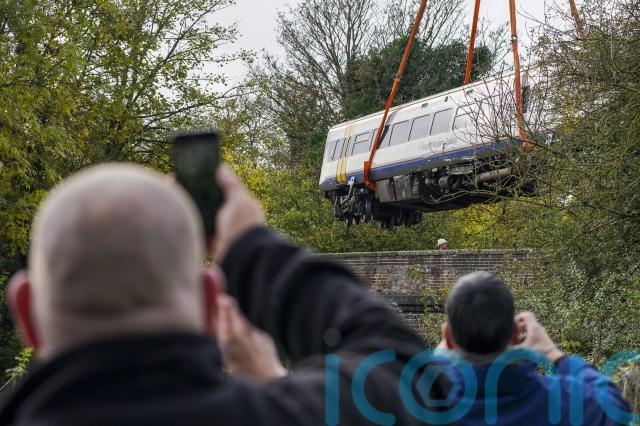
A train driver involved in a crash which injured 14 people did not apply the brakes early enough before encountering a red signal, a report has found.
The Rail Accident Investigation Branch (RAIB) said Network Rail had not “effectively managed the risks” of leaves on the line before the collision between two passenger trains in Salisbury, Wiltshire, in 2021.
The RAIB said one of the trains involved in the crash was almost in a “potentially far more serious collision” with a train travelling in the opposite direction – which was avoided by “less than a minute”.
Watch a summary https://t.co/C551zP2shC of the main factors we identified during our investigation into a collision between passenger trains at Salisbury Tunnel Junction, Wiltshire, 31 October 2021.
— RAIB (@raibgovuk) October 24, 2023
One member of railway staff and 13 passengers needed hospital treatment after a South Western Railway and Great Western Railway passenger service crashed at Salisbury Tunnel Junction on October 31.
The crash forced the closure of the line between Salisbury and Andover for 16 days, as more than 900 metres of new track were laid and almost 1,500 sleepers were installed.
According to the report published by the RAIB on Tuesday, the driver “did not apply the train’s brakes sufficiently early on approach to the signal protecting the junction to avoid running on to it”.
The RAIB said in the immediate aftermath of the collision that it believed the South Western Railway train went past a red signal at the junction as its wheels slipped on the rails, due to low adhesion.
It concluded in its report that wheels slipped due to leaves that had fallen on the track and a spell of wet weather on the day of the crash.
It also said Network Rail’s Wessex route had “not effectively managed” the leaves on the track with “either proactive or reactive measures”.
South Western Railway not effectively preparing its drivers for assessing and reporting low adhesion conditions was another possible underlying factor, the report added.

The RAIB has made 10 recommendations, seven of which were directed at Network Rail.
Training and competence of staff dealing with vegetation management and seasonal delivery were among them.
Andrew Hall, chief inspector of rail accidents at RAIB, said: “This was a very serious accident and the first time since our inception in 2005 that RAIB has investigated the collision of two passenger trains travelling at significant speed.
“The phrase ’leaves on the line’ may cause some to smile. But the risks associated with leaves being crushed on to the top of rails by the pressure of trains’ wheels, resulting in a slippery layer, is very real and long known.
“As with many accidents, this one resulted from a combination of many different circumstances coming together, both in the time before the accident and on the day.
“As a result, the barriers put in place to avoid this type of event did not work effectively.”
Subscribe or register today to discover more from DonegalLive.ie
Buy the e-paper of the Donegal Democrat, Donegal People's Press, Donegal Post and Inish Times here for instant access to Donegal's premier news titles.
Keep up with the latest news from Donegal with our daily newsletter featuring the most important stories of the day delivered to your inbox every evening at 5pm.